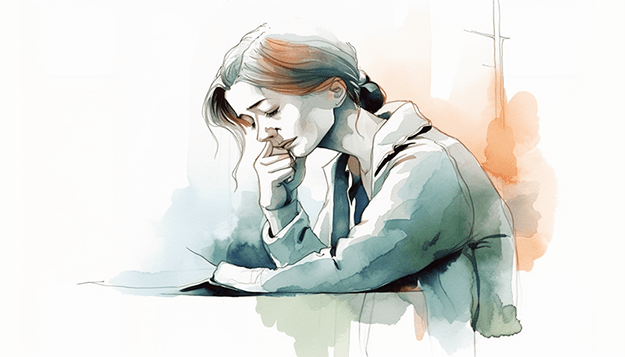
Three of the top grief search statements I see about grief daily are: “Grief therapy near me”, “How do I know I need grief therapy?” and “What is grief therapy?” As a therapist specializing in grief therapy, I speak to many people unsure if they need grief therapy. My quick answer is that grief therapy is helpful when you begin to wonder if grief therapy is helpful. Therapists consider this a stage of contemplation where you have acknowledged that a change is needed, but you are unsure if you are ready and need more information. However, it is also important to consider two broader ideas when determining if you need grief therapy.
Society’s norms about grief
Like it or not, society does not get to decide how, when and for how long you need to grieve. No two people grieve the same. You may have a vastly different experience of grief from anyone in your support network. You may even feel highly isolated due to this difference and find it difficult to discuss it with your family and friends. We naturally feel uncomfortable about death, and sometimes our friends and family have difficulty discussing your grief or knowing what to say without causing more sadness. The important part to note is that your support network’s avoidance has nothing to do with you and everything to do with their own grief anxiety.
Society also tends to expect a grief timeline. There always seems to be a personal expert on the Kubler-Ross stages of grief. Your friend or family may try to fit your grief into that model. Unfortunately, just as grief differs for everyone, so is their timeline and what theoretical framework their grief follows. One characteristic of all grief theories (more than 20 that I can think of) is that none mention a duration or time for the person to grieve. Your grief will last a lifetime; what will change is how you emotionally and physically respond to your grief.
So as you evaluate your need for grief therapy, if your support network has begun to dwindle, or you find it difficult to talk to them about your grief, you may want to find a grief therapist.
Impact on your daily living
Grief is a sneaky experience because it can touch multiple parts of our life. Along with intense emotions, grief can make it challenging to maintain healthy relationships or be productive at work. It can make us feel paralyzed and keep us from venturing out due to all the reminders of the person that died. We can even have difficulty concentrating, and keeping up with daily tasks. One symptom of grief I often hear from my clients is difficulty with short-term memory. My clients use therapy to help them identify emotions and behaviors related to grief. This helps bring the grief into awareness and allows them to have a bit more control.
Insight and awareness of grief reactions are a good place to start with grief therapy. It might be a good time to go to grief therapy when your reaction to grief continues to affect your daily living. The truth is, you are an expert in your life, and you know what you want to change.
How does grief therapy work?
Grief therapy is a discovery process tailored to fit you. It also provides a safe, non-judgmental place to express all emotions about your grief experience. The intent is for you to safely express your grief while learning more about how your grief impacts your life. From there, we work together to determine how you want to change your experiences and identify ways to navigate a new world without the person who died.
How long does grief therapy last?
The length of grief therapy is determined by you and what you think you need moving forward. It also depends on the loss you experienced or if there were multiple losses. When I begin to work with a client, we consider two or three realistic and obtainable goals to focus on. This gives us a marker to know if therapy is working. What doesn’t happen (at least in my practice), is therapy will end when either your goal has been met, or you are no longer making any progress with me as your therapist. In other words, grief therapy is not limited as long as you benefit from the work. And if you are having difficulty with grief again, you can go back and focus on new goals.
Hopefully, this gives you a little more information about grief therapy. If you have questions, please don’t hesitate to reach out. I appreciate the bravery and vulnerability to start grief work.
Call Now
Or fill out a contact form
